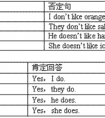用所给词的正确形式填空。1. When can you finish (read) the book?2. Would you like (watch) TV? 3. He (not come) here yesterday.4. What do you want(be) when -八年级英语
指“人”的个体,但只表示复数概念:There are five people in my family.
前面加定冠词指“人民”,表示复数概念:Let’s work for the people.
指“民族”时,有单、复数之分:The Chinese people is a hardworking people.
person强调“人”的个体,有单、复数之分:There are five persons in my family.
3.police总称“警察”,表示复数概念:
policeman强调“警察”的个体,有单、复数之分:My father is a policeman.
4.universe指“宇宙万物”,强调物质概念:
When we talk about the universe,we mean the earth, the sun,the moon and many other stars.
space指“太空”、“宇宙空间”,强调空间概念:
Many countries have sent up the satellites into space.
“空间”、“余地”、“空地”:There is no space on the bus.
5.不同国家的人的单复数:
|
名称 |
总称(谓语用复数) |
一个人 |
两个人 |
|
中国人 |
the Chinese |
a Chinese |
two Chinese |
|
瑞士人 |
the Swiss |
a Swiss |
two Swiss |
|
澳大利亚人 |
the Australians |
an Australian |
two Australians |
|
俄国人 |
the Russians |
a Russian |
two Russians |
|
意大利人 |
the Italians |
an Italian |
two Italians |
|
希腊人 |
the Greek |
a Greek |
two Greeks |
|
法国人 |
the French |
a Frenchman |
two Frenchmen |
|
印度人 |
the Indians |
an Indian |
two Indians |
|
加拿大人 |
the Canadians |
a Canadian |
two Canadians |
|
德国人 |
the Germans |
a German |
two Germans |
|
英国人 |
the English |
an Englishman |
two Englishmen |
|
瑞典人 |
the Swedish |
a Swede |
two Swedes |
|
日本人 |
the Japanese |
a Japanese |
two Japanese |
|
美国人 |
the Americans |
a American |
two Americans |
考点名称:不定代词
- 不定代词:
即不指明代替任何特定名词或形容词的代词。
初中常用不定代词有:
some(something,somebody,someone),any(anything,anybody,anyone), no(nothing,nobody,no one),
every(everything,everybody,everyone,),all,each,both,much,many,(a)little,(a)few,other(s),
another,none,one,either, neither等。一般来讲,修饰不定代词的词要置于其后。 不定代词用法例举:
①一般用于肯定句中的不定代词:some, someone, somebody, something
例如:They can speak some Japanese.
②一般用于否定句、疑问句和条件句中的不定代词:any, anyone, anybody, anything
例如:Is there anyone at home?
③一般用于句中表示否定意义的不定代词:no, no one, nobody, nothing
例如:I have no watch.
There is nothing wrong with the machine.
④不定代词one指代可数名词,既可指人,亦可指物,它可以代替上文中出现的单数可数
名词,指代复数名词时可以用ones。
例如:I do not have a pen, can you lend me one?
I like small cars better than large ones.
⑤none通常只用作名词,在句中作主语、宾语等。意为“没有任何(人或物)”,既可指人,亦可指物。
none后常跟of短语,其后用复数可数名词或不可数名词。
例如:None of them knows the answer to the question.
⑥both, all
both指两个人、物或群体;
all指三个以上的人、物或群体或泛指一切事物。
例如:My parents are both teachers.
All of my friends are football fans.
⑦every, each
each一般用于指两个或两个以上的人或物,侧重个别;
every用于指三个或三个以上的人或物,侧重全体。而且each所指对象在上下文中已十分明确。
例如:Each student went to see that films. (学生至少二人)
Every student went to the park.(学生至少三人)
⑧other, the other, others, the others, another
other具有名词和形容词性质,既可指人,亦可指物。other常与定冠词the连用。
不定冠词an与other连用则组成another。other只作形容词或代词,表示“其他的,别的”,不可单独使用。
例如:Do you have any other questions?
the other作形容词或代词,特指两者中或两部分的另一个或另一部分。
例如:The bookshop is on the other side of the street.
others相当于“other+名词”,泛指“别的人或物”,只有名词性用法。
例如:Some are planting trees, others are watering them.
the others相当于“the other+名词”,表示“剩下的,其余的”,特指除此之外的全部 人或物。
例如:There are forty-six students in our class. Two of them are foreign, the others are all Chinese.
another作形容词或代词,泛指三个或三个以上不定数目中的“另一个”。
例如:This pen is too expensive, please show me another.
⑨either, neither
either指“两者中的任何一个”;neither指“两者中无一”,具有否定意义。
例如:You can take either half.
Neither of the books is good.
⑩many, much, most
many和much具有名词和形容词的性质,都表示“许多、大量”。
Much一般只能指代或修饰不可数名词,many只能指代或修饰复数可数名词。Most指“大部分、大多数”。
例如:Many boys like playing soccer.
We have much homework to do every day.
Most students think so.
(11)few, a few, little, a little
a few 和a little 意为“少数、少量”,其意义是肯定的。
A few指代或修饰复数形式的可数名词,a little指代或修饰不可数名词。
Few 和little意为“几乎一点没有”,具有否定意义。
例如:He has a few friends here.
Hurry up! There is little time left.- 不定代词的用法:
不定代词大都可以代替名词和形容词,在句中作主语、宾语、表语、定语和状语。
位置
不定代词+形容词
不定代词+to do
作主语
Both of them are teachers.他们两人都是教师。
作宾语
I know nothing about this person.我对这个人一无所知。
作表语
This book is too much for a child.这本书对一个小孩来说太难了。
作定语
There is a little water in the glass.玻璃杯里有一些水。
作状语
I can't find my book anywhere.我在任何地方都不能找到我的书。
- 最新内容
- 相关内容
- 网友推荐
- 图文推荐
| [家长教育] 孩子为什么会和父母感情疏离? (2019-07-14) |
| [教师分享] 给远方姐姐的一封信 (2018-11-07) |
| [教师分享] 伸缩门 (2018-11-07) |
| [教师分享] 回家乡 (2018-11-07) |
| [教师分享] 是风味也是人间 (2018-11-07) |
| [教师分享] 一句格言的启示 (2018-11-07) |
| [教师分享] 无规矩不成方圆 (2018-11-07) |
| [教师分享] 第十届全国教育名家论坛有感(二) (2018-11-07) |
| [教师分享] 贪玩的小狗 (2018-11-07) |
| [教师分享] 未命名文章 (2018-11-07) |

![Which of the following can you probably see in the meeting room? [ ]A. B. C.D. -七年级英语](http://www.00-edu.com/d/file/ks/4/2/dongmingci/2020-01-08/small97361980a56115e1c9237567439904fe1578422951.jpg)

![—Can the boy finish_____ the book in about a week? —I think he can. [ ]A. read B. reading C. to read D. reads -八年级英语](http://www.00-edu.com/d/file/ks/4/2/dongmingci/2020-01-08/smallfa4d713075e249356362fe7392193a301578421751.png)


